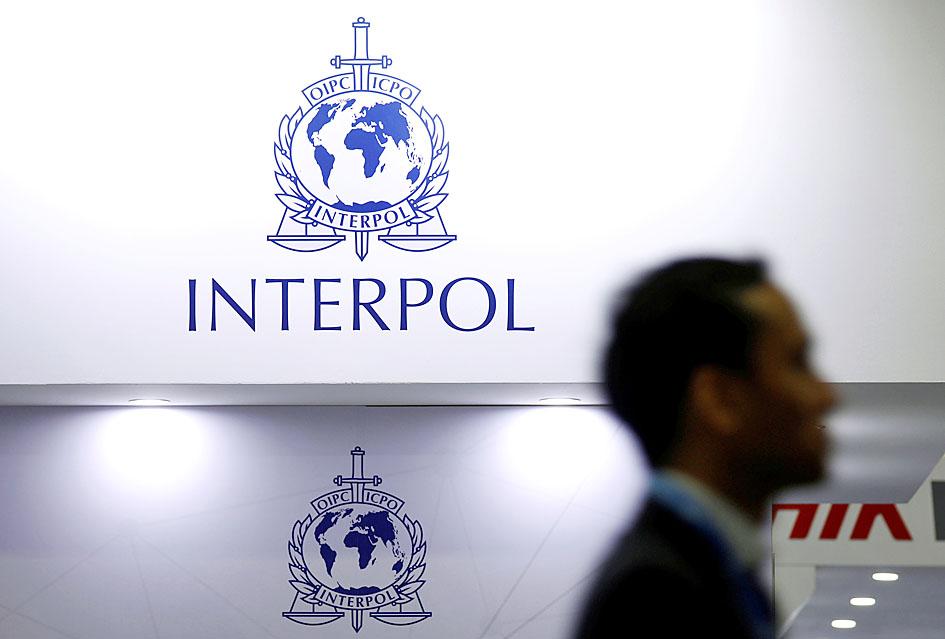Seventy-one US representatives signed a joint letter urging US President Joe Biden’s administration to assist Taiwan’s bid to join the International Criminal Police Organization and participate as an observer in the Interpol General Assembly next week.
The letter, based on a bipartisan initiative by US representatives John Curtis, Michael Guest and Gerry Connolly, was sent to US Attorney General Merrick Garland, Secretary of State Antony Blinken and Interpol Washington Director Michael Hughes on Tuesday last week.
A news release issued on Thursday by Curtis’ office cited the letter as saying that by participating in Interpol, Taiwan could work with the US and other international allies to fight corruption and abuse of the Interpol system.

Photo: Reuters
“Taiwan’s lack of participation leaves a void in global crime-fighting efforts,” the lawmakers wrote.
Taiwan must obtain second-hand information from friendly nations, and is unable to effectively share information about criminals and suspicious activity with the international community, they said.
The letter also highlighted laws that require Washington to develop strategies to assist Taiwan’s efforts to participate in Interpol, as well as other international organizations.
These include a bill signed into law by then-US president Barack Obama on March 18, 2016, and the Taiwan Allies International Protection and Enhancement Initiative Act, which was signed into law by then-US president Donald Trump on March 26 last year.
The “legislation clearly demonstrates congressional intent to support strategies to gain meaningful Interpol participation, and ultimately membership, for Taiwan,” the representatives wrote.
Curtis’ news release said: “This administration needs to fulfill the intent laws passed by Congress, counter China’s influence and make a strong push for Taiwan’s participation in Interpol ahead of the general assembly meeting later this month.”
Taiwan joined Interpol in 1961 using its formal name, the Republic of China, but was forced to withdraw when the People’s Republic of China joined the organization in 1984. Interpol has since denied Taiwan’s requests to participate, citing a resolution at its 53rd General Assembly that accepted China as a member.
This year’s general assembly is to take place from Tuesday to Thursday in Istanbul, Turkey.

AGING: As of last month, people aged 65 or older accounted for 20.06 percent of the total population and the number of couples who got married fell by 18,685 from 2024 Taiwan has surpassed South Korea as the country least willing to have children, with an annual crude birthrate of 4.62 per 1,000 people, Ministry of the Interior data showed yesterday. The nation was previously ranked the second-lowest country in terms of total fertility rate, or the average number of children a woman has in her lifetime. However, South Korea’s fertility rate began to recover from 2023, with total fertility rate rising from 0.72 and estimated to reach 0.82 to 0.85 by last year, and the crude birthrate projected at 6.7 per 1,000 people. Japan’s crude birthrate was projected to fall below six,

Conflict with Taiwan could leave China with “massive economic disruption, catastrophic military losses, significant social unrest, and devastating sanctions,” a US think tank said in a report released on Monday. The German Marshall Fund released a report titled If China Attacks Taiwan: The Consequences for China of “Minor Conflict” and “Major War” Scenarios. The report details the “massive” economic, military, social and international costs to China in the event of a minor conflict or major war with Taiwan, estimating that the Chinese People’s Liberation Army (PLA) could sustain losses of more than half of its active-duty ground forces, including 100,000 troops. Understanding Chinese

US President Donald Trump in an interview with the New York Times published on Thursday said that “it’s up to” Chinese President Xi Jinping (習近平) what China does on Taiwan, but that he would be “very unhappy” with a change in the “status quo.” “He [Xi] considers it to be a part of China, and that’s up to him what he’s going to be doing, but I’ve expressed to him that I would be very unhappy if he did that, and I don’t think he’ll do that. I hope he doesn’t do that,” Trump said. Trump made the comments in the context

SELF-DEFENSE: Tokyo has accelerated its spending goal and its defense minister said the nation needs to discuss whether it should develop nuclear-powered submarines China is ramping up objections to what it sees as Japan’s desire to acquire nuclear weapons, despite Tokyo’s longstanding renunciation of such arms, deepening another fissure in the two neighbors’ increasingly tense ties. In what appears to be a concerted effort, China’s foreign and defense ministries issued statements on Thursday condemning alleged remilitarism efforts by Tokyo. The remarks came as two of the country’s top think tanks jointly issued a 29-page report framing actions by “right-wing forces” in Japan as posing a “serious threat” to world peace. While that report did not define “right-wing forces,” the Chinese Ministry of Foreign Affairs was